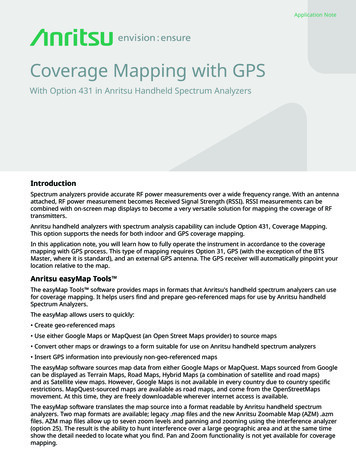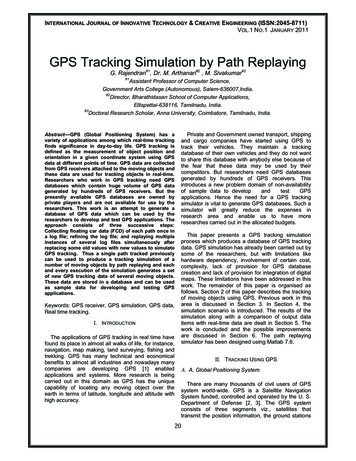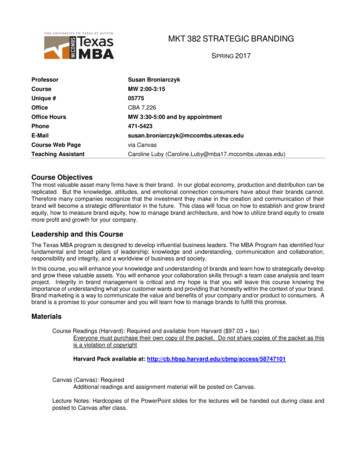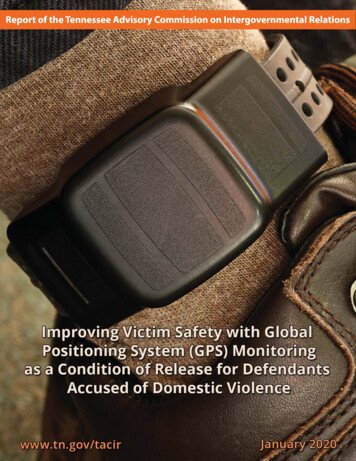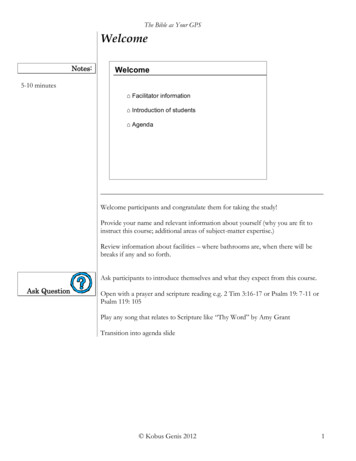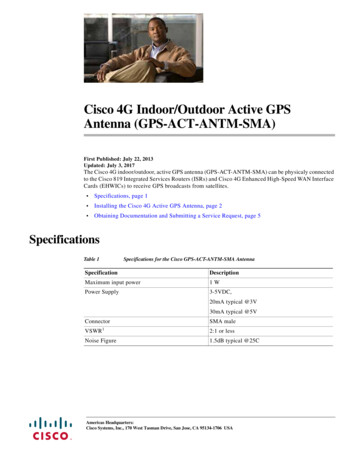Transcription
Court Services and Offender Supervision Agencyfor the District of ColumbiaPOLICYSTATEMENTGLOBAL POSITIONING SYSTEM (GPS) TRACKING OF OFFENDERSI. COVERAGEThis Policy Statement establishes procedures for the Court Services and Offender SupervisionAgency for the District of Columbia (CSOSA or Agency) staff involved in the Global PositioningSystem (GPS) tracking of offenders. CSOSA staff with specific responsibilities under theseprocedures include GPS electronic monitoring technician staff, Community Supervision Officers(CSOs), Supervisory Community Supervision Officers (SCSOs), and Branch Chiefs (BCs). Thispolicy does not apply to the Pretrial Services Agency (PSA).II. BACKGROUNDHistorically, electronic monitoring has been used as a special condition of release ordered by theSuperior Court of the District of Columbia or the United States Parole Commission (USPC) foroffenders under community supervision. In recent years, CSOSA has piloted use of a specificform of electronic monitoring, GPS tracking, as a sanctioning condition. This and other forms ofelectronic monitoring can be used to enforce curfews, establish prohibited/restricted areas, andassess and monitor offender movement in the community. These tools allow CSOSA to provideheightened supervision of identified offenders while allowing such offenders to remain in thecommunity.III. POLICYCSOSA utilizes GPS tracking or curfew monitoring of offenders as a special condition of releaseordered by the releasing authority, a case planning and supervision tool, a crime preventionmeasure, a component of the Agency’s graduated sanctions continuum, and as a mechanism forcollaborating with the Metropolitan Police Department and other allied law enforcement agenciesto track criminal behavior of designated CSOSA offenders. GPS tracking is used to establishcurfews for moderate/high risk offenders, to monitor movement of high risk offenders in thecommunity, and to monitor sex offenders and offenders with stay away orders as determined byorder of the releasing authority or when determined necessary by a CSO, in consultation withhis/her SCSO. The offender is required to sign Global Positioning System (GPS) Basic
Court Services and Offender Supervision Agency for the District of ColumbiaPolicy Statement 4008Effective Date: 05/07/2009Page 2Guidelines Contract (Appendix B), which details the terms of the imposed period of GPStracking.CSOSA’s GPS electronic monitoring technicians are responsible for installing and operating allmonitoring equipment. GPS staff also are required to report any curfew violations to the assignedCSO on a daily basis. This information may be relayed via automatic or manually created emails, phone calls, faxes, and violation reports. The GPS staff will provide training to CSS staffand allied law enforcement staff as defined by a Memorandum of Understanding (MOU) orformal agreement with CSOSA, make recommendations for improving the GPS process, andinvestigate offender GPS usage and equipment as requested by the CSO or SCSO.CSOs are responsible for supervising offenders during the period of GPS tracking/curfewmonitoring, closely monitoring their GPS tracks, and preparing any alleged violation reports(AVRs) as needed to advise the releasing authority when verifiable GPS tracking violationsoccur. CSOs shall review the GPS tracking information received each business day from the GPSUnit to note any violations. Violations must be investigated with the GPS staff, and offendersshall be sanctioned according to CSOSA’s policy if violations are substantiated by the GPS staff.Information received from the GPS staff may include automatic or manually sent e-mails, phonecalls, faxes, and violation reports. Information received regarding violations is to be noted inSMART, along with sanctions, within three business days of the CSO receiving confirmationfrom the GPS unit. CSOs also shall log into the GPS software system to review offender trackingpoints as needed. CSOs shall recommend to the SCSOs offenders for placement on GPS.SCSOs are responsible for reviewing CSO requests for GPS placement and then referring eligibleoffenders for GPS tracking or curfew monitoring so GPS staff can begin the monitoring process.SCSOs are to review at least weekly the violation reports received from the GPS staff. SCSOsshall ensure that the CSOs respond swiftly to GPS violations appropriately. SCSOs shall berequired to confer with the CSOs within two business days of the receipt of e-mails noting anoffender’s GPS violation. The purpose of the consultation is to provide direction to the CSO thatthe appropriate sanction is implemented due to the offender’s GPS violation.IV. AUTHORITIES, SUPERSEDURES, REFERENCES, AND ATTACHMENTSA. AuthoritiesNational Capital Revitalization and Self-Government Improvement Act of 1997, D.C.Official Code § 24-133 (c) (2001 Edition).28 C.F.R. § 2.85(a)(15) (Conditions of release; D.C. Code parolees)
Court Services and Offender Supervision Agency for the District of ColumbiaPolicy Statement 4008Effective Date: 05/07/2009Page 3B. SuperseduresPS 4008, Global Positioning System (GPS) Tracking of Offenders, effective 5/11/2005.OI CSS-2008-04, GPS Monitoring and Discovery of No GPS Tracking Points, effective8/21/2008.C. Procedural ReferencesCSOSA ScreenerGraduated Sanctions Policy StatementLoss-of-Contact Policy StatementD. AttachmentsAppendix A. General ProceduresAppendix B. Global Positioning System (GPS) Basic Guidelines Contract
Court Services and Offender Supervision Agency for the District of ColumbiaPolicy Statement 4008Effective Date: 05/07/2009Page 4APPENDIX AGENERAL PROCEDURESGlobal Positioning System (GPS) monitoring provides a powerful tool to help CommunitySupervision Officers (CSOs) enforce offenders’ compliance with supervision and treatmentrequirements. CSOSA uses GPS as a tool to enhance the supervision strategies employed by theCSOs. In addition to intensively supervising offenders placed on GPS through office visits, homeand employment verifications, and drug testing, GPS is used to closely monitor the movementsand whereabouts of offenders placed on GPS. GPS also is used to establish curfews andexclusionary zones where offenders are not permitted to enter.The GPS Unit is responsible for coordinating and managing the GPS program for CSOSA. CSOsare responsible for reviewing offender compliance with GPS monitoring and taking appropriateaction to address violations once verified by the GPS unit.A. Offender Eligibility Requirements1. General Eligibility RequirementsThe offender must meet each of the following requirements in order to be enrolled inGPS. If all requirements are not met, but extenuating circumstances are reported tothe CSO that may pose a problem with the referral to GPS, the CSO shall consult withmanagement for further instruction. CSOs shall proceed with supervision based uponapplicable existing CSOSA policies and procedures:a. The offender must sign the GPS Agreement;b. The offender must agree and have the ability to charge the GPS device every 810 hours. Homeless offenders are not prohibited from being placed on GPS.They can report to the GPS office on a daily basis to charge the device, or canreport to their assigned CSO/supervision unit to charge their device, as long asa charger is available on the unit;c. When applicable, the owner/lessee of the property where the equipment will beinstalled (if different from the offender) must sign the GPS Basic GuidelinesContract prior to installation of the required equipment;d. When applicable, the person in whose name the telephone is listed (if differentfrom the offender and/or the owner/lessee) must sign a GPS Basic GuidelinesContract prior to installation of the GPS equipment; ande. The offender must not have willfully destroyed or lost any electronicmonitoring or GPS equipment during a previous enrollment period.
Court Services and Offender Supervision Agency for the District of ColumbiaPolicy Statement 4008Effective Date: 05/07/2009Page 52. Special Condition Ordersa. Offenders placed on GPS pursuant to an order of the releasing authority,generally the USPC or the Superior Court for the District of Columbia, areautomatically eligible to participate in the GPS program if all of the generaleligibility requirements in section A.1, above, have been met.If the GPS tracking time frame is not specified in the order from the releasingauthority, the referring CSO shall determine the number of days an offendermust submit to GPS tracking up to a maximum of ninety (90) days. Thetracking period can be extended in 30 day increments with the approval of theSCSO.3. GPS as a SanctionIn response to non-compliant behavior or identified risk, the CSO may implement GPSmonitoring as a sanction on the offender for up to thirty (30) calendar days. Whereaggravating circumstances exist, such as continuous curfew violations, new arrest, lossof contact, or positive drug tests, the length of time the offender is placed on GPStracking may be extended for up to a total of ninety (90) calendar days, upondocumented approval of an SCSO.Offenders may be placed on GPS tracking under any of the following circumstances:a. Loss of ContactOnce contact is reestablished through an office visit, the CSO shall examinethe circumstances resulting in the offender’s loss of contact. Should the CSOdetermine that an actual loss of contact violation has occurred, the CSO shallrefer the offender for GPS placement as a sanction within two (2) businessdays. If the offender is assessed as being high-risk, is a sex offender, or has astay away order as determined by order of the releasing authority, the CSO andthe SCSO shall confer and decide whether to place the offender on GPStracking within five (5) business days after contact has been reestablished withthe offender. These procedures do not supersede CSOSA’s policy regardingloss of contact.b. Re-arrestAny offender currently under supervision, who is re-arrested and then releasedto the community pending judicial action, may be referred to GPS as a sanctionwithin five (5) business days of the CSO’s notification of the re-arrest inconsultation with the SCSO.
Court Services and Offender Supervision Agency for the District of ColumbiaPolicy Statement 4008Effective Date: 05/07/2009Page 6The CSO and the SCSO shall confer with respect to the utility of placing thearrested offender on GPS tracking as a sanction and the appropriate number ofdays if it is determined that GPS tracking would be useful.c. Sex Offender CasesAny sex offender presenting high-risk behavior (e.g., unsupervised contactwith children, violation of stay-away orders, or substance abuse), asdetermined through screening and assessment, shall be referred with theSCSO’s approval to the GPS staff for GPS tracking for up to ninety (90) days.Any sex offender with a history of escape from halfway houses or othertransitional programs shall be referred to GPS staff for GPS enrollment up toninety (90) days or, if the offender is assessed as being high-risk forreoffending (maximum or intensive supervision) shall be referred for GPSenrollment for up to ninety (90) days.d. Mental Health CasesMental health offenders who are non-compliant with their supervision plan, asit relates to infractions other than the failure to use their prescribedpsychotropic medication, may be referred to GPS staff for GPS enrollment fora minimum of thirty (30) days. GPS will be used to provide close monitoringas a component of their treatment plan to bring them into compliance withsupervision.e. Domestic Violence CasesDomestic violence offenders who are subject to stay away conditions may bereferred to GPS staff for GPS enrollment for up to ninety (90) days based onthe risk of the case as assessed by the CSO and confirmed by the SCSO.Domestic violence respondents who are subject to Civil Protection Orders arenot eligible for GPS tracking unless the presiding judge has ordered GPS as aspecial condition, or authorization of the presiding judge and the concurrenceof the Assistant D.C. Attorney General is obtained after imposition of the CPO.f. Recalcitrant, Unemployed OffendersOffenders who are unemployed and not enrolled in school or a trainingprogram; are at maximum or intensive level of supervision; and are notactively, aggressively searching for employment shall be placed on GPS as anincentive to find employment. Once employment has been obtained, and theoffender has maintained that employment for 30 consecutive days, the GPS canbe removed at the CSO’s discretion.
Court Services and Offender Supervision Agency for the District of ColumbiaPolicy Statement 4008Effective Date: 05/07/2009Page 7g. PCP Positive Drug Testing OffendersOffenders testing positive for the drug PCP shall be immediately sanctionedwith GPS and referred to the GPS staff for emergency placement on GPS.Continued sanctioning in accordance with Agency policy and procedures alsoshall be initiated.B. GPS Monitoring Referral Process1. Upon determining eligibility for GPS and concurrence with the SCSO, the CSO shallmake a GPS referral in SMART within two (2) business days and shall complete andsubmit via e-mail a GPS monitoring referral form to the GPS Help Desk staff.2. Within two (2) business days of receipt of the referral, GPS Unit staff shall providewritten confirmation of referral receipt to the supervising CSO.3. Within two (2) business days of the confirmation, GPS staff shall schedule a GPSmonitoring equipment installation date at the GPS office4. GPS staff shall notify the CSO of the scheduled installation date at least three (3)business days prior to installation so the CSO can notify the offender.5. Should GPS staff be unable to complete the equipment installation process due to theoffender’s lack of cooperation, the offender’s failure to report for GPS equipmentinstallation, or the inability to secure the required authorization from the offenderand/or the owner/lessee of the property, GPS staff shall notify the CSO. The CSOshall request cooperation from the offender and/or the owner/lessee. If the CSO isunable to get the needed cooperation, the CSO must notify the releasing authority viaan Alleged Violation Report (AVR) within three (3) business days that the offenderand/or owner/lessee is not cooperating with GPS installation, and the equipmentcannot be installed due to the offender’s lack of cooperation.6. GPS staff shall document in SMART the date that the offender was placed on GPS andany other relevant comments to complete the referral process.7. GPS staff also shall make an emergency GPS placement, if requested by the SCSO.C. CSO ResponsibilitiesRegarding the placement of offenders on GPS, the CSO is responsible to:1. Identify offenders to be placed on GPS and get concurrence from his or her SCSO.
Court Services and Offender Supervision Agency for the District of ColumbiaPolicy Statement 4008Effective Date: 05/07/2009Page 82. Ensure the offender understands why he or she is being placed on GPS and for howlong, if there is a curfew or zone exclusion area, and consequences for failing to abideby the conditions of GPS.3. Obtain all necessary consent forms from the offender and home owner or leasee, ifapplicable.4. Document the CSO referral in the Agency’s information system, SMART(Supervision, Management, and Automated Record Tracking system).5. Send an electronic e-mail copy of the GPS Referral Form to the GPS Unit staff, alongwith all required consent forms.6. Consistently and actively monitor an offender’s GPS activity for the entire time theoffender is on GPS and address all violations within three (3) business days.a. The CSO or designee shall review the offender’s compliance on a daily basisby reviewing e-mails, faxes, violation reports, or the GPS tracks and shallimmediately address any violations and sanction the offender, if appropriate,according to Agency policy specific to offender sanctioning.b. At least one (1) time per week, the CSO shall review in the GPS softwareprogram the offender’s movement and discuss with the offender his or hermovements in the community to determine areas the offender has frequentedthat may contribute to new violations, to establish collateral contactspreviously unknown, and to assess the offender’s compliance with the GPSsystem. If the offender is found to be in violation of a curfew or zoneexclusion area, or has other GPS violations (i.e., bracelet strap, No GPSsignals, low battery, etc.), the offender is to be sanctioned according to Agencypolicy specific to offender sanctioning.c. The CSO shall discuss with the offender any noted GPS violations and, ifneeded, send the offender to the GPS staff to inspect the GPS equipment andverify that the equipment is fully functional. NOTE: For offenders on GPSwho are assigned to a sex offender team, were placed on GPS as a result ofa stay away order, or were identified as a person of interest to any lawenforcement partners, the CSO shall view the offender’s movement eachbusiness day to ascertain if the offender has violated any of the general orspecial conditions of the offender’s release.d. If the offender is found to be in violation of GPS conditions, the offender is tobe sanctioned according to Agency policy specific to offender sanctioning.7. Consider legitimate requests from the offender to change a curfew schedule. The CSOshall require the offender to provide notice at least two (2) business days in advance ofthe requested date of curfew change. Legitimate reasons for curfew changes include,but are not limited to: changes in work schedule, death and funerals of close familymembers, medical emergencies, or severe physical injury. Curfew changes must be
Court Services and Offender Supervision Agency for the District of ColumbiaPolicy Statement 4008Effective Date: 05/07/2009Page 9set in the GPS monitoring system and include a signed copy of the curfew schedule,which is to be provided to the offender and maintained in the case file. NOTE:Curfews are not valid unless signed documentation exists verifying that theoffender is aware of the curfew parameters.8. Notify the GPS staff of any problems, concerns, changes in offender status, curfew orexclusion zone changes, and offender GPS activations and deactivations.9. For offenders who are homeless, the CSO shall instruct the offender to report to theGPS staff or assigned CSO’s office daily to charge the monitoring device daily inorder to download data from the GPS monitoring device.10. Notify the GPS staff when an offender’s GPS device needs to be deactivated due to theoffender’s status having changed since the offender was placed on GPS (i.e., loss ofcontact, warrant issued, or rearrest).D. GPS Unit Staff ResponsibilitiesThe GPS Unit staff must:1. Place offenders referred by the CSO on GPS within five (5) business days of the initialreferral being made, unless the request is for emergency GPS placement.2. Create a SMART running record to document and notify the CSO that an offender wasplaced and activated on GPS or did not report for GPS installation as required. Therunning record is to be e-mailed to the CSO and SCSO.3. Instruct offenders and/or the owner/leasee on how to properly use the GPS equipment.4. Notify the CSOs each business day via automatic e-mails, manually generated e-mails,faxes, phone calls, and/or violation reports of offenders who are non-compliant withGPS as evidenced by GPS violations.5. Investigate alleged equipment failures and provide feedback to the CSO and offender,as appropriate. This information shall be documented in SMART.6. Manage and track GPS equipment usage and inventory.7. Work with the GPS system vendor(s) on system issues, billing discrepancies, andsystem improvements.8. Remove offenders from GPS and obtain equipment with documentation in SMART.9. Communicate regularly with CSOs, SCSOs, BCs, and management on GPS issues.
Court Services and Offender Supervision Agency for the District of ColumbiaPolicy Statement 4008Effective Date: 05/07/2009Page 1010. Train CSOSA staff and other allied law enforcement agencies on GPS tracking,technology, and issues.E. Offender and Owner/Leasee GPS ResponsibilitiesTo participate in GPS tracking, both the offender and owner/leasee of the residence in which theoffender is residing, if applicable, must agree to adhere to the following conditions during theperiod of GPS tracking:1. The CSO shall instruct an offender on GPS to:a. Observe any curfew during the hours specified by the releasing authority and/orsupervising CSO in the Offender Agreement and any prohibited zone locationsspecified by the supervising CSO or releasing authority.b. Allow GPS staff reasonable access to install, service or inspect, disconnect andremove the GPS tracking equipment in the residence.c. Wear an ankle transmitter at all times during the established period of GPSmonitoring.d. Comply with the verbal and written instructions, provided by GPS staff or thesupervising CSO, for proper operation of the tracking device.e. Furnish electrical power and telephone service, if applicable.f. Refrain from tampering with or removing the tracking device without permissionfrom GPS staff or the supervising CSO.g. Immediately inform the supervising CSO in advance of any change of address,telephone number, discontinuation of phone service, change in home ownership orlease, or any emergency situation necessitating the offender’s departure from theresidence during the tracking period.h. Report immediately to the CSO and GPS staff any equipment damage,malfunction, or power outages.i. Return the GPS equipment without significant external or internal damage causedby negligent handling or deliberate actions.j. Sign the Global Positioning System (GPS) Basic Guidelines Contract and TrackingEquipment Assignment Contract.
Court Services and Offender Supervision Agency for the District of ColumbiaPolicy Statement 4008Effective Date: 05/07/2009Page 11k. Charge the device every 8-10 hours for 45 minutes to one (1) hour.l. Provide notice to the offender of the consequences for non-compliance with thisPolicy Statement.2. Owner/Leasee ConditionsWhen applicable, the supervising CSO must obtain the written consent and agreement ofthe owner or leasee of the residence in which the offender will reside to agree to have theGPS tracking equipment installed, prior to the installation of the GPS equipment, if theoffender is not the resident owner or leasee of his or her residence. In the written consentform, the owner/leasee must agree to:a. Allow GPS staff reasonable access to install, service, inspect, disconnect andremove the GPS tracking equipment in the residence.b. Furnish electric power and telephone service for the GPS tracking of theoffender living in the residence beginning on the date requested and for theduration of the stated monitoring period.c. Follow the verbal and written instructions provided by GPS staff pertaining toproper operation of the GPS device.d. Refrain from tampering with or removing the GPS equipment withoutpermission from GPS staff.F. GPS Violations, Sanctions, and Alleged Violation (AVR) ReportsThe offender population is very creative in its attempts to find ways to deter GPS detection. Forexample, offenders have learned that wrapping the GPS device in aluminum foil can make theGPS tracking points untraceable and disappear. Offenders also may devise other methods to deterGPS detection. Until technology is implemented to address this issue, CSOs must be vigilant inreviewing offenders’ GPS activities via GPS reports, GPS tracks, faxes or e-mails on a daily basisso that acts of non-compliance can be quickly identified and sanctioned.All GPS violations shall be investigated by the GPS Unit staff upon request by the CSO and, iffound valid, the offender is to be sanctioned according to Agency policy. The violation andsanction shall be documented in SMART, as appropriate and according to Agency policy, withinthree (3) business days of discovering the violation.
Court Services and Offender Supervision Agency for the District of ColumbiaPolicy Statement 4008Effective Date: 05/07/2009Page 121. Types of Violationsa. Refusal to cooperate with GPS placement.If an offender is referred for GPS tracking but fails to report as scheduled for theinitial GPS equipment installation, the GPS staff shall notify the CSO immediatelyby placing a running record entry into SMART noting the offender’s no-show forGPS installation. The GPS staff will e-mail the running record to the assignedCSO. The CSO is to sanction the offender for not reporting as required and is tore-refer the offender for GPS enrollment. If the offender’s failure to report isexcused by the CSO, the CSO shall reschedule the offender’s installation withinfive (5) business days. If the offender fails to report for the second installationdate, and that appointment is not excused by the CSO, the CSO shall submit anAlleged Violation Report to the releasing authority within three (3) business daysof the second missed date.b. No GPS Alert.The No GPS alert means that the GPS device is not able to determine theoffender’s location for a predetermined length of time, usually after one (1) hour,and will result in a No GPS alert. With a No GPS alert, the GPS device is workingand calling into the GPS system with monitoring data. However, because of poorcellular coverage or some kind of interference in certain areas, the device cannotbe picked up by the satellites. Offenders who reside in apartment complexes mayexperience No GPS alerts more often. However, the GPS system can still track theoffender’s last movement before the No GPS alarm first started.c. Low Battery Alarm.A low battery alarm occurs if the battery is in need of charging. If the offenderfails to charge the battery after receiving this warning, the GPS device willcontinue to buzz until the device shuts down, and the offender will not be able tobe tracked. The low battery alarm violation usually precedes the message gapsviolation.d. Message Gaps.Message gaps are generated after the GPS system has not communicated with theGPS device for a predetermined amount of time one (1) hour. Typically, thisviolation is caused because the GPS device has lost power due to it not beingcharged correctly, the GPS device is in a poor cellular coverage area, or theoffender may be tampering with the GPS device by putting aluminum foil aroundthe unit or trying to circumvent the signal. The best indicator that the GPS device
Court Services and Offender Supervision Agency for the District of ColumbiaPolicy Statement 4008Effective Date: 05/07/2009Page 13has lost power and simply needs to be recharged is when the message gap violationwas preceded by a low battery event, usually four (4) hours before the message gapevent occurs. Additionally, when the offender charges the device, the data arecalled in and will send in all GPS points and event records that occurred during thetime of the message gap.e. Bracelet Strap Alert.A bracelet strap alert is an indication that some type of strap tamper has occurred.The offender may have removed the device and/or the device may be sending afalse reading. The bracelet strap alert violation occurs as soon as the device isremoved or is not operating properly. All offenders who receive a bracelet strapviolation shall be sent to the GPS office by the CSO as soon as the CSO is awarethat a violation has been detected, or the next business day, so that the GPS staffcan conduct an investigation to determine if the violation is valid.f. Inclusion Zone (Curfew) Alert.An inclusion zone alert is produced when the GPS offender who has a scheduledcurfew has gone outside of his or her area, namely the place of residence or has notreturned prior to the curfew expiring. In either case, the offender is outside of hisor her coverage area. The CSO shall refer the matter to the GPS unit to investigatethe alert to determine if the zone needs to be adjusted, or if the address needs to beupdated.g. Exclusion Zone Alarm.An exclusion zone alarm is produced when the GPS offender enters into arestricted area designated as off limits by the CSO and/or the releasing authority.This alarm indicates that the offender, who was instructed to stay away from thelocation, has violated this condition.h. No GPS Points—Possible GPS Tampering.Offenders who attempt to hide their GPS data may wrap their GPS device inaluminum foil. To identify these cases where GPS tracking points are missing, itis imperative that the CSO review GPS data on a daily basis to determine if anyGPS tracking points are missing for an extended period of time where the reasonfor the missing points cannot be attributed to the offender cutting off the GPSbracelet or failing to charge the GPS device. An extended period of time is for 15minutes or greater. If the offender tampers with the GPS device, such as bywrapping the GPS device in aluminum foil, an automatic violation may not berecorded. One can assume that an offender who attempts to thwart the GPS signalmay be engaging in criminal activity that the offender does not want to be knownto the Agency or the Metropolitan Police Department (MPD). Therefore, it is
Court Services and Offender Supervision Agency for the District of ColumbiaPolicy Statement 4008Effective Date: 05/07/2009Page 14critical that the CSO review the GPS tracking points on a daily basis to determineif any are missing.2. Sanctions in Response to Violations.Before an offender is sanctioned for a GPS violation, or the violation is cited in an AVR,the violation must be investigated to determine if the GPS violation is valid. Upondiscovering a possible violation, the CSO is to contact the offender within one (1) businessday and direct the offender to report into the office to address the violation issue. TheCSO also is to contact the GPS unit staff to determine if there was any GPS system orequipment issue that could have resulted in
PS 4008, Global Positioning System (GPS) Tracking of Offenders, effective 5/11/2005. OI CSS-2008-04, GPS Monitoring and Discovery of No GPS Tracking Points, effective 8/21/2008. C. Procedural References . CSOSA Screener Graduated Sanctions Policy Statement Loss-of-Contact Policy Statement D. Attachments . Appendix A. General Procedures
